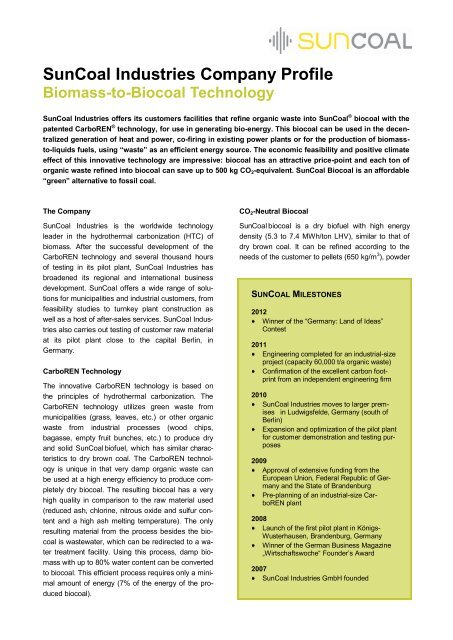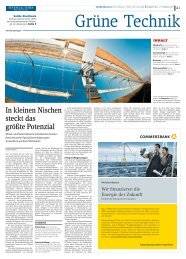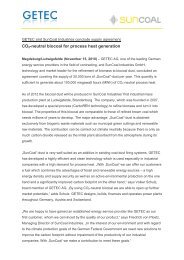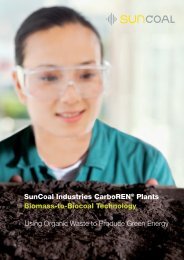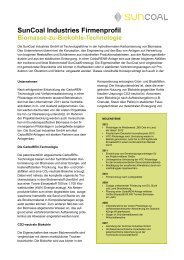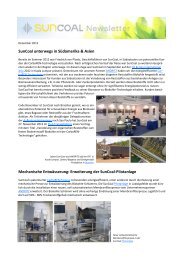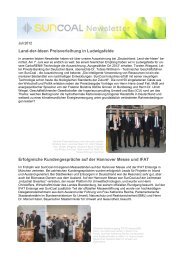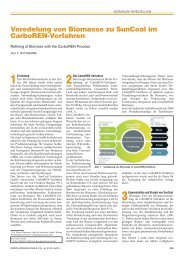SunCoal Industries Company Profile Biomass-to-Biocoal Technology
SunCoal Industries Company Profile Biomass-to-Biocoal Technology
SunCoal Industries Company Profile Biomass-to-Biocoal Technology
You also want an ePaper? Increase the reach of your titles
YUMPU automatically turns print PDFs into web optimized ePapers that Google loves.
<strong>SunCoal</strong> <strong>Industries</strong> <strong>Company</strong> <strong>Profile</strong><br />
<strong>Biomass</strong>-<strong>to</strong>-<strong>Biocoal</strong> <strong>Technology</strong><br />
<strong>SunCoal</strong> <strong>Industries</strong> offers its cus<strong>to</strong>mers facilities that refine organic waste in<strong>to</strong> <strong>SunCoal</strong> ® biocoal with the<br />
patented CarboREN ® technology, for use in generating bio-energy. This biocoal can be used in the decentralized<br />
generation of heat and power, co-firing in existing power plants or for the production of biomass<strong>to</strong>-liquids<br />
fuels, using “waste” as an efficient energy source. The economic feasibility and positive climate<br />
effect of this innovative technology are impressive: biocoal has an attractive price-point and each <strong>to</strong>n of<br />
organic waste refined in<strong>to</strong> biocoal can save up <strong>to</strong> 500 kg CO2-equivalent. <strong>SunCoal</strong> <strong>Biocoal</strong> is an affordable<br />
“green” alternative <strong>to</strong> fossil coal.<br />
The <strong>Company</strong><br />
<strong>SunCoal</strong> <strong>Industries</strong> is the worldwide technology<br />
leader in the hydrothermal carbonization (HTC) of<br />
biomass. After the successful development of the<br />
CarboREN technology and several thousand hours<br />
of testing in its pilot plant, <strong>SunCoal</strong> <strong>Industries</strong> has<br />
broadened its regional and international business<br />
development. <strong>SunCoal</strong> offers a wide range of solutions<br />
for municipalities and industrial cus<strong>to</strong>mers, from<br />
feasibility studies <strong>to</strong> turnkey plant construction as<br />
well as a host of after-sales services. <strong>SunCoal</strong> <strong>Industries</strong><br />
also carries out testing of cus<strong>to</strong>mer raw material<br />
at its pilot plant close <strong>to</strong> the capital Berlin, in<br />
Germany.<br />
CarboREN <strong>Technology</strong><br />
The innovative CarboREN technology is based on<br />
the principles of hydrothermal carbonization. The<br />
CarboREN technology utilizes green waste from<br />
municipalities (grass, leaves, etc.) or other organic<br />
waste from industrial processes (wood chips,<br />
bagasse, empty fruit bunches, etc.) <strong>to</strong> produce dry<br />
and solid <strong>SunCoal</strong> biofuel, which has similar characteristics<br />
<strong>to</strong> dry brown coal. The CarboREN technology<br />
is unique in that very damp organic waste can<br />
be used at a high energy efficiency <strong>to</strong> produce completely<br />
dry biocoal. The resulting biocoal has a very<br />
high quality in comparison <strong>to</strong> the raw material used<br />
(reduced ash, chlorine, nitrous oxide and sulfur content<br />
and a high ash melting temperature). The only<br />
resulting material from the process besides the biocoal<br />
is wastewater, which can be redirected <strong>to</strong> a water<br />
treatment facility. Using this process, damp biomass<br />
with up <strong>to</strong> 80% water content can be converted<br />
<strong>to</strong> biocoal. This efficient process requires only a minimal<br />
amount of energy (7% of the energy of the produced<br />
biocoal).<br />
CO2-Neutral <strong>Biocoal</strong><br />
<strong>SunCoal</strong> biocoal is a dry biofuel with high energy<br />
density (5.3 <strong>to</strong> 7.4 MWh/<strong>to</strong>n LHV), similar <strong>to</strong> that of<br />
dry brown coal. It can be refined according <strong>to</strong> the<br />
needs of the cus<strong>to</strong>mer <strong>to</strong> pellets (650 kg/m 3 ), powder<br />
SUNCOAL MILESTONES<br />
2012<br />
Winner of the “Germany: Land of Ideas”<br />
Contest<br />
2011<br />
Engineering completed for an industrial-size<br />
project (capacity 60,000 t/a organic waste)<br />
Confirmation of the excellent carbon footprint<br />
from an independent engineering firm<br />
2010<br />
<strong>SunCoal</strong> <strong>Industries</strong> moves <strong>to</strong> larger premises<br />
in Ludwigsfelde, Germany (south of<br />
Berlin)<br />
Expansion and optimization of the pilot plant<br />
for cus<strong>to</strong>mer demonstration and testing purposes<br />
2009<br />
Approval of extensive funding from the<br />
European Union, Federal Republic of Germany<br />
and the State of Brandenburg<br />
Pre-planning of an industrial-size CarboREN<br />
plant<br />
2008<br />
Launch of the first pilot plant in Königs-<br />
Wusterhausen, Brandenburg, Germany<br />
Winner of the German Business Magazine<br />
„Wirtschaftswoche“ Founder’s Award<br />
2007<br />
<strong>SunCoal</strong> <strong>Industries</strong> GmbH founded
or granulate (400 kg/m 3 ). The biocoal can be used<br />
directly as a renewable energy source in existing<br />
power plants and combined heat and power plants,<br />
etc. In addition, biocoal can be processed in<strong>to</strong> syngas<br />
and secondary products, such as secondgeneration<br />
liquid BtL-fuels through gasification<br />
(Fischer-Tropsch-Synthesis). Compared <strong>to</strong> brown<br />
coal, <strong>SunCoal</strong> biocoal is a renewable energy source<br />
and its application CO2-neutral. <strong>SunCoal</strong> only releases<br />
the CO2 that has already been absorbed by<br />
organic material during its growth via pho<strong>to</strong>synthesis.<br />
CarboREN Plant Operation<br />
A CarboREN plant can be constructed according <strong>to</strong><br />
the needs of the cus<strong>to</strong>mer and according <strong>to</strong> the<br />
amount of organic waste available per year and its<br />
composition. A CarboREN plant becomes economically<br />
attractive with the input amount of 60,000 <strong>to</strong>ns<br />
of raw material per year. Existing biomass processing<br />
sites are ideal for CarboREN plants, as well as<br />
other sites that have synergies for energy use or<br />
biomass processing. A CarboREN plant with continuous<br />
production is highly au<strong>to</strong>mated, requiring little<br />
additional personnel.<br />
Economic Feasibility and Carbon Footprint<br />
The high revenues that can be generated from biocoal<br />
contribute significantly <strong>to</strong> the overall economics<br />
of investing in a CarboREN plant. Organic waste can<br />
be treated in an environmentally friendly manner at a<br />
CarboREN plant with mid-size capacity (60,000 t/a<br />
input) without the need for any additional disposal<br />
cost. The process also produces a positive effect on<br />
the climate, saving about 500 kg CO2-equivalent for<br />
each <strong>to</strong>n of organic waste processed <strong>to</strong> biocoal.<br />
His<strong>to</strong>ry<br />
The <strong>SunCoal</strong> <strong>Industries</strong> success s<strong>to</strong>ry began with the<br />
„re-discovery“ of the process of hydrothermal carbonization.<br />
Friedrich Bergius initially discovered the<br />
process at the beginning of the 20th century. His<br />
process described the carbonization of biomass in<strong>to</strong><br />
coal in a matter of hours, which in nature would usually<br />
take millions of years. In order <strong>to</strong> reduce our dependency<br />
on fossil fuels and <strong>to</strong> reduce CO2 emis-<br />
www.suncoal.com<br />
<strong>SunCoal</strong> <strong>Industries</strong> GmbH Tel: +49 3378 88122 10<br />
Rudolf-Diesel-Strasse 15 Fax: +49 3378 88122 19<br />
14974 Ludwigsfelde info@suncoal.com<br />
sions, the founders of <strong>SunCoal</strong> started <strong>to</strong> work on<br />
their first attempts at hydrothermal carbonization at<br />
the Technical University in Berlin, Germany. They<br />
there laid the groundwork for the patented<br />
CarboREN technology used <strong>to</strong>day.<br />
Shortly after the successful launch of the first pilot<br />
plant in Königs-Wusterhausen, Germany, in 2008,<br />
<strong>SunCoal</strong> <strong>Industries</strong> received the Founder’s Award<br />
from Wirtschaftswoche, Germany’s most influential<br />
business magazine. In 2012, <strong>SunCoal</strong> was a winner<br />
in the “Germany: Land of Ideas” contest, which<br />
awards especially innovative and forward-thinking<br />
companies. Through the further development of the<br />
CarboREN technology, <strong>SunCoal</strong> <strong>Industries</strong> has won<br />
many new business partners in order <strong>to</strong> provide<br />
cus<strong>to</strong>mers with the best, most competent service<br />
possible.<br />
Investing in the Future<br />
<strong>SunCoal</strong> <strong>Industries</strong> engages with scientific, technical<br />
and business organizations and institutions in further<br />
R&D. For example, <strong>SunCoal</strong> <strong>Industries</strong> cooperates in<br />
a joint R&D project sponsored by the German Federal<br />
Ministry for Education and Research with the<br />
Technical University Berlin and the Potsdam Institute<br />
for Climate Research on the development of hydrothermal<br />
carbonization of biomass (see www.htclabs.org).<br />
Additionally, <strong>SunCoal</strong> <strong>Industries</strong> was the<br />
founding member of the Federal Hydrothermal<br />
Carbonization Association (Bundesverband Hydrothermale<br />
Carbonisierung e.V.).<br />
Berlin<br />
<strong>SunCoal</strong><br />
in Ludwigsfelde


